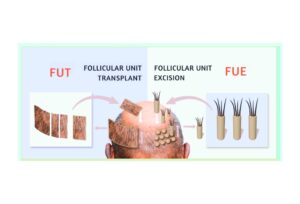Your hair is an integral part of your identity and self-esteem. When you start noticing thinning hair, it can affect many aspects of your life and can change the way you feel about yourself. A hair transplant surgery is the best way to permanently regain the natural appearance of your hair, but it is not a decision you should make without careful consideration. Here are the top 10 signs you’re ready to take the next step with your hair transplant journey.
1. You’re of the right age.
Both men and women can experience hair loss at any age after puberty, and if you are still relatively young and have already been dealing with premature balding for several years, you may be eager to jump into hair restoration. Though this is understandable, many experienced hair loss surgeons recommend waiting until you are in your 30s and beyond. That’s because it’s difficult to conclusively determine what shape your hair loss pattern might take until your balding has advanced to a certain degree. If you have extensive hair loss and are at least 30 years old, however, a hair loss surgery can produce transformative results that make it worth the wait.
2. You have enough donor hair to provide the coverage you want.
There are various ways for pattern baldness to manifest. While this might sound contradictory to the previous point, men who are considering hair loss surgery will need to still have a substantial amount of hair on the sides and at the back of their head to use as grafts. The best way to determine if you are a good candidate is to identify your level of baldness on the Norwood scale. Most skilled surgeons can provide good results with patients who fall between classes 3 and 6.
3. You are willing to be patient.
Hair restoration does not provide overnight results. If you’ve been dealing with thinning hair for quite some time, it’s understandable you would want to see thicker, fuller regrowth as soon as possible, but the full hair transplant timeline can take as long as a year. That’s because the newly transplanted hair doesn’t pick up the hair growth cycle immediately. You should have realistic expectations for what will happen after your hair transplant, including that the transplanted hairs will fall out and then grow back again. Remember, the best things come to those who wait. Your reward for seeing the complete process through to its conclusion will be a lush head of hair that you can cut and style any way you want.
4. Hair-loss medications are not as effective as they once were.
Treatments like minoxidil and finasteride can help slow hair loss and, in some people, can even encourage new hair to grow. However, if you’ve been taking them for several years, you may have started to see less of a benefit over time. If you’re noticing the effects of these medications have levelled off somewhat, or you are starting to be concerned about their side effects, it may be prime time to get a hair transplant.
5. You are tired of hiding your hair loss.
Is your closet full of hats, wigs or scarves you rely on to mask the degree of your hair loss so others won’t notice and comment on how far things have progressed? Or, have you become so acutely aware of your thinning hair that you use these accessories as crutches to hide your baldness from yourself so you don’t accidentally catch sight of your reflection in a store window? After a successful hair transplant surgery, you’ll be able to be yourself again. You’ll have nothing to hide, and you’ll be able to enjoy your results for years.
6. You’ve been balding for at least five years.
When you initially notice your hair thinning, your first reaction may be to nip it in the bud immediately. However, for best results, you should hold off on exploring hair restoration surgery until you have been balding continuously for five years or more. Because hair loss is a gradual process, waiting until you’ve experienced thinning hair for several years in a row will help your doctor get a full understanding of what shape your hair loss is taking, and tailor an approach that will provide the best results.
7. You’re in good physical health.
Though a hair transplant is a relatively low-risk surgery, you’ll still want to provide your doctor with your complete medical history, including any prescription or over-the-counter drugs you take regularly. Some medical conditions might interfere with your healing process, and hair loss is a known side effect of several specific medications. Tell your doctor about all these before committing to surgery to ensure the best results.
8. You are ready to improve your quality of life.
Some people are hesitant to get cosmetic surgery like a hair transplant for fear other people will judge them. However, don’t let anyone else hold you back from deciding to do something you feel is right for you. Your happiness is paramount, and getting a hair transplant can represent a significant new phase in your life that gives you the boost you need to pursue new opportunities and realize your full potential.
9. You’ve done your homework.
Before committing to a hair transplant, it’s worth your time to do the research and become a more informed patient. Some questions to ask during your consultation with a hair loss specialist include:
- Am I a good candidate for this surgery?
- What should I expect during the healing process, and how long should I plan for my recovery?
- What procedure do you recommend for me?
- How should I care for my transplants and donor site after surgery to ensure the best results?
10. It’s become all you can think about.
One of the most clear-cut signs you’re ready for a hair transplant is that your hair loss has started to be an all-consuming concern of yours. When you get up in the morning, do you examine your hairline to see if you have lost more hair overnight? Does it take longer to get ready to leave the house because you are painstakingly styling your hair to hide thinning patches and bald spots? Don’t let your hair loss make you feel bad about yourself anymore. It’s time to take a step in the right direction and schedule a consultation.
Is It Time for Hair Restoration?
If you found yourself answering “yes” to one or more of the questions on this list, contact our Toronto office to learn more about hair restoration surgery. At the Toronto Hair Restoration Centre, we have developed a reputation for providing natural-looking results that leave patients feeling proud of their revitalized appearance. As a practice that is fully devoted to hair restoration surgery, we have worked with hundreds of patients from around the world.

















